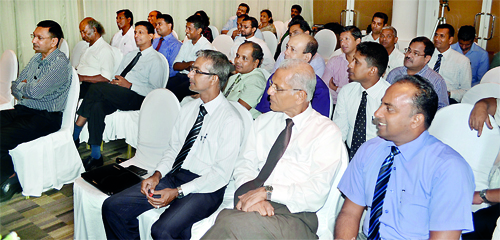Every SL household must have an emergency response plan, security expert says
The magnitude of crimes committed in Sri Lanka is double the figures quoted as unreported cases are higher than the reported cases, according to a top police officer.

Ajith Rohana
This was stated by Ajith Rohana, Senior Police Superintendent and Police Media Spokesman, one of the panelists at a discussion on ‘Home Security issues’ conducted at the monthly meeting of the Sunday Times Business Club (STBC) on Wednesday at Cinnamon Lakeside Hotel.
He said that the latest statistics, categorized offences as grave crimes, house breaking, thefts, etc. The figures he quoted were in 2009 – 17,600; 2010 – 18,500 and 2013 – 16,000. He emphasized; “But it is not the whole crime that happened in Sri Lanka. These are the reported numbers but the unreported number is higher than the reported number”.
He said that the role of the police is to maintain law and order in the country and said “we should enforce the law” and reminded that they are in the post war period – a big challenge.
In Sri Lanka, he said that crimes are categorized into two main parts – offences against persons (40 per cent) and offences against property (60 per cent).
Crime prevention is the technique of elimination of opportunities for the commission of crime, Mr. Rohana pointed out and said that the prevention of crime is the primary responsibility of the police, but the success depends on the support and participation of the community and the opportunities are provided by the society. Community policing, with support from the people, was the key towards ensuring a crime-free society.

Damith Kurunduhewa
When the Police Department was established in 1866 the British rulers, he said, created a gap between the police and the general public as they needed to control people. There are 104 Sections in the Police Ordinance all of which are not good for the general public. But, he said the situation now is different as not only Sri Lanka but the whole world has now embraced community policing.
House breaking and theft happen mostly due to open doors, windows and gates, he said. To prevent house breaking and thefts, the doors and windows should be kept under lock and key when leaving the house, large sums of money and also expensive jewellery should be kept in the bank , he pointed out. When keys are lost or stolen, the entire locks and keys should be change.
When nobody is at home, it would be good if the home appearance is created by a radio on and a light in the night, he said and noted that most criminals operate in the dark. He advised never to keep the keys under the door-mat or in flower pots or anywhere outside the house as burglars are aware of those places.
Criminals advance on the victims when they leave or enter home, and approach them on the pretext of looking for someone, delivering goods, using the toilet, telephone, renting room in response to newspaper advertisements, etc, Mr. Rohana pointed out.As prevention, he said to keep the gate locked all the time. Identify the visitors through the door viewer. Inspect a stranger’s credentials through the door opening with the chain fastened. He advised “Never, never, never open the door to

Vipul Hettige
strangers. This is absolutely important.”
Armed robber in the house? Surrender the belongings one at a time but try to remember how the intruder looks like and if alone never confront, he advised. Installing CCTV cameras or some electronic alarm device would prevent crime. In recent cases CCTV cameras have helped to identify some criminals, he said.
Damith Kurunduhewa, Corporate Risks and ERP BCP Specialist, another panelist said that one should not be too optimistic that crime would not reach a person but someone else, giving former journalist Mel Gunasekera’s murder case as an example and to take precautions. “Optimism is not complacency,” he added.
He said that some of the multinationals put up massive boards telling the workers “Be safe at work, your family is waiting for you in this evening”. They actually do lot of safety activities within the company to ensure that the employee goes back home in one piece. He had one simple message; “Have an ERP – Emergency Response Plan.

Section of the audience. Pix by Hasitha Kulasekera
Every household should have one in case any crisis occurs, not only a robbery.”
Vipul Hettige, Executive Director, Certis Lanka, which handles sophisticated home security systems spoke of the application of electronic security devices to protect persons and homes and comprehensive protection solutions. To identify the vulnerability and the extent of risk involved, first a risk assessment should be conducted, he said.
Taking into consideration the precarious situation of the country where crime, burglaries, house-breaking have become common place occurring during day and night, members of the STBC had several queries and questions for the panelists. Cinnamon Lakeside is the host hotel of the club.



